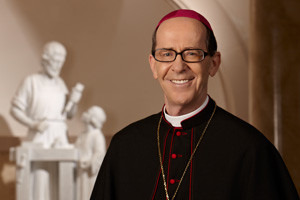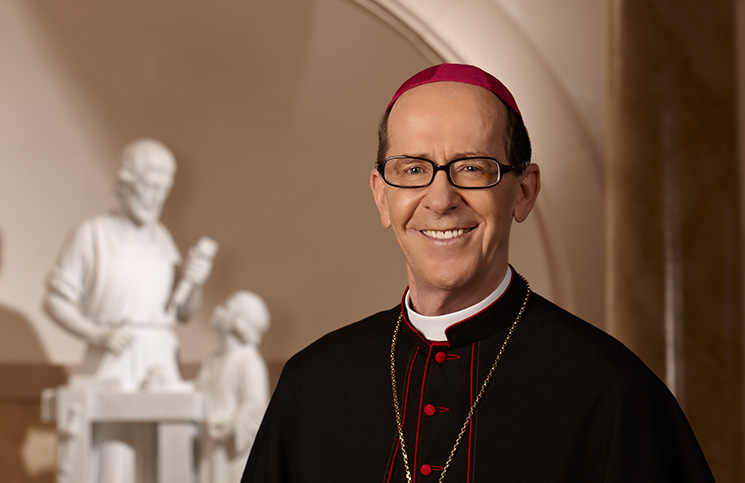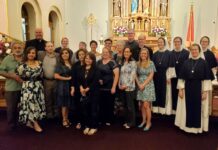Key ways to evangelize today’s culture
In previous parts of this series, we looked at temptations to resist and things to be avoided in our mission as Catholics in America today. Now we shall consider a number of tasks we need to be about in order to effectively bear witness to Christ and bring about the New Evangelization in our nation. With gratitude, I shall be calling upon the wise thoughts of our three most recent popes, whom the Holy Spirit has graciously given us as guides in these times.

Now we shall look at the first three of these tasks, which are: trust the truth; live God’s plan for marriage; and be pure of heart. In following issues of The Catholic Sun, we shall look at the rest.
1. Trust the truth.
On our money is written the words, “In God we trust,” words that were obviously inspired by people of faith. Would we Americans, today, still approve such a motto? I would hope so, because it is our American heritage to trust in God, and the present generation of Catholics in America is called to remind our fellow citizens of this heritage. To trust in God is to trust in His word, to trust in the truth, even when it may require courage to live in accord with the truth, and even heroic virtue to defend and bear witness to it. Such trust lies at the heart of every vocation in the Church and is required for any mission in Christ to succeed. If we trust God, if we trust the truth, which we know through faith and reason, then nothing will keep us from bearing witness to Christ, no matter the cost.
As Catholics, we believe that truth is accessible to human beings, i.e. that, even though we must work with our minds and hearts to grasp it, it is possible to know the truth. We also believe that, by our very nature, human beings are “hard-wired” for truth and are naturally attracted to it; we sense, deep down within us, that truth is good for us, that it holds many benefits for us and for the common good.
This is perhaps most convincing and most important when a certain truth taught by the Church is culturally or politically incorrect. In this culture, daily we breathe in the idea that our individual happiness is dependent on getting, taking, increasing and so forth. The Lord, however, tells us, “It is better to give than to receive,” and that only the seed which dies becomes what it was made to be (Cf. Jn 12:24). When we stop taking and give, we discover that the paradoxes are true.
Parents in our nation are reminded daily to fear the conception of another child, to see the child as a burden, an expense, a threat to happiness. But the Church teaches what all parents know deep down, “Children are the supreme gift of marriage and contribute greatly to the good of the spouses themselves” (CCC 1652).
Trust the truth. G.K. Chesterton wrote, “The Church is a living teacher, not a dead one…It has not merely told this truth or that truth, but has revealed itself as a truth-telling thing. All other philosophers say the things that plainly seem to be true; only this philosophy has again and again said the thing that does not seem to be true, but is true. Alone of all the creeds it is convincing where it is not attractive.”
Pope Francis points out that faith fulfills a pivotal role in discovering the truth. He writes (Lumen Fidei, #23), “Unless you believe, you will not understand.” Truth and faith, in other words, are bound together. Faith opens the door to truths that reason alone could never come to know. Many of our contemporaries doubt the very existence of objective truth, seeing value only in what might be called subjective truths such as personal convictions. Personal convictions, however, since they only are held by individuals, are incapable of upholding the common good.
Trusting the truth, because sometimes the truth is not obvious, takes faith. This is why our brave new secular world experiences such confusion. The decline of faith in our times has led to what has been called a “culture of skepticism” in which, as Pope Francis writes (Lumen Fidei, 25), “Truth itself, the truth which would comprehensively explain our life as individuals and in society, is regarded with suspicion.” Since we Catholics are not immune from the culture around us, and because vociferous sectors of this skeptical culture harshly criticize truths of faith, a number of Catholics also have lost confidence in the truths that come to us from Christ through the Church. Such loss of confidence impedes, if not totally destroys, our ability to stand up for the rights of the most vulnerable in society and to bear convincing witness to the Gospel. In a skeptical age, our nation needs from us a humble yet confident witness to the truth that finds its fullness in Jesus, the truth that sets people free.
2. Live God’s plan for marriage.
At the time that Blessed John Paul II visited St. Louis in January of 1999, he spoke about the connection between marriage and the future. Here are his words: “As the family goes, so goes the nation.”
Marriage and family are the often hidden lifeblood of a nation. Christian marriages today, though, are called out of hiding to be the domestic “cities on a hill” of our time. The joyful witness of actual happy marriages and families is how the truth about God’s plan for marriage is most eloquently handed on to others. “Matrimony is a Gospel in itself, a Good News for the world of today, especially the dechristianized world,” said Benedict XVI (Oct. 7, 2012). “The union of a man and a woman… is a sign that speaks of God with a force and an eloquence.” This is why married couples and their children hold a place of great importance in the Church’s mission of evangelization.
No society can survive the collapse of marriage. For this reason, the Church vigorously defends the public definition of marriage in law. Meanwhile, all over the United States we are seeing the development of excellent marriage preparation programs that ready couples for their vital role in the Church and society. Such programs include instruction in Natural Family Planning, a renewed presentation of the Gospel and a clear articulation of the importance of closeness to the Lord Jesus in married life. The critical mission of life and love to which husbands and wives are called proclaims God’s love in an irreplaceable way. Marriages are truly icons of God’s love in the world. Icons are meant to be visible! We need many such icons in America today to show convincingly the beauty and truth of God’s plan for marriage.
3. Be pure of heart.
St. Paul tells the Christians of the first century in Rome (Rom 13:11-13), “It is now the hour for you to wake from sleep. The night is far spent; the day draws near. Let us cast off the deeds of darkness and put on the armor of light. Let us live honorably as in daylight.” Popular culture in America has been badly distorted by a steady diet of false images of femininity and masculinity, reaching its most grotesque form in pornography, but seen also in the promotion of so-called “homosexual marriage.”
St. Paul’s summons to vigilance is badly needed in our day: it truly is the hour to put off deeds of darkness and to replace them with deeds of light. Who else but the Church is in a position to build a culture of chastity, a culture of sexual integrity? Until we succeed in doing so, we shall never succeed in building a culture of life.
While the obstacles are great, let our hope be strong. Recall the wisdom St. Paul (Cf. Rom 5:20) “Where sin abounds, grace abounds all the more.” Confident that God’s power works most wondrously in the midst of weakness, let us not lose hope. Instead, let us watch in prayerful expectation, precisely at this time when society is severely weakened by a promiscuous culture. If we do our part through prayer and the pursuit of virtue, the Lord will make fruitful the Church’s witness to the wisdom of Jesus’ words (Mt 5:8), “Blessed are the clean of heart, for they shall see God.”
Next time, I shall continue this presentation of the tasks we Catholics in America need to do in order to fulfill our mission from Christ at this time in history.






![[VIDEO] Make Sunday feel like Sunday again](https://www.catholicsun.org/wp-content/uploads/2021/04/2021-YOUTUBE-BISHOP-MESSAGE-THUMBNAIL-ENGLISH-218x150.png)
